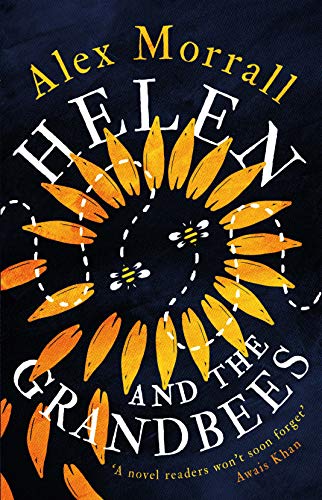4 Stars
Social services took away Lily – Helen’s child/her “bee” – because she was unable to properly care for her: “The System took her to ‘Better parents, older parents, ones with a similar ethnic background’.” Twenty years later, Lily (now known as Ingrid) arrives at Helen’s door. Slowly, the two build a relationship, though strains develop when Lily wants information about her father and grandparents, information Helen refuses to share. Helen loves her grandchildren Aisha and Ryan, her grandbees, and when Lily’s choices put them in danger, Helen has to confront her past to protect them.Helen is a unique narrator. Trauma in her past has left her mentally fragile; she has spent time not in the hospital but “in the other building. The one next door. The mental ward.” Slowly it emerges that she requires sleeping pills, anti-anxiety drugs, and antidepressants. Because of events in her childhood and adolescence, she suffers from post-traumatic stress. To cope, she has tried to bury her past but when Lily keeps prodding for information, Helen becomes severely anxious. To complicate her situation, Helen knows that she may lose Lily once again if she doesn’t give her what she wants.
Because Helen is the narrator, what happened to her in the past is not directly mentioned. It is not difficult, however, to determine what occurred. Sufficient information is revealed by her fragmented memories, nightmares, and triggers. Only to Lily does the truth not seem to be obvious, but then she doesn’t ever directly ask why Helen doesn’t want to talk about her family. It is to Aisha that Helen says, “’Maybe I don’t tell you because I love you?’”
Whereas Helen is endearing, I found Lily difficult to like. Constantly discontented, she moves from one relationship to another. She divorces her first husband because she becomes bored with him! I became increasingly frustrated with her choices, especially when they obviously impact her son and daughter. She is so selfish and self-centred that she cannot see the effect her constant questions have on her mother. She puts her need to know ahead of any concerns about why her mother might not want to discuss Lily’s heritage. Helen perhaps has more understanding of Lily’s behaviour: “maybe my secrets are what gives Lily-Bee the discontent, because she is looking for something I cannot tell her. She is looking for something that I cannot solve for her, so she looks in other places to find the things I cannot give her. She turns to the arms of different men so that she knows where she is going, even if she doesn’t know where she comes from.”
The novel touches on a number of difficult subjects, but all are treated sensitively. For me, it is the portrayal of mental illness that stands out. Helen has all the symptoms of post-traumatic stress disorder and because she hasn’t received help and support, she sees her life as “a broken-up jigsaw, no roots, no branches, no sky, no ground, no horizon, but the blankness never went away.” She tries to cope as best she can, trying to live a better life. She believes Lily was taken away because Helen wasn’t able to keep her home clean so now she obsesses about cleanliness. Her capacity for love is such that it leaves Lilly confused and admitting, “I really don’t know what to do with all that love.”
The theme is that love can overcome fear. Helen must face her worst fears in order to protect her grandchildren from danger. In the process, she also helps herself; she thinks “the pieces of my life [are] almost forming a complete whole. I have started to see the picture that is my broken jigsaw, and there are only a few more pieces to add here and there.”
This novel has a dynamic protagonist whom the reader will come to admire; it thoughtfully examines mental illness; it has an uplifting message; and it is written in a captivating style. There is much to recommend and little to criticize.
Note: I received a digital galley from the publisher via NetGalley.

No comments:
Post a Comment